If you’re dealing with debt collectors in Illinois, understanding Illinois debt collection laws is crucial. This guide explains your rights, what collectors can and cannot do, and how to protect yourself from harassment. You’ll learn about key differences between state and federal laws, licensing requirements for collectors, prohibited practices, and steps to take if you’re being harassed or sued.
Key Takeaways
- The Illinois Collection Agency Act protects consumers from abusive debt collection practices, including harassment and deceptive tactics, requiring clear communication of debt details.
- Illinois law requires debt collectors to be licensed and regulates various collection practices, providing additional protections that exceed federal regulations in certain areas.
- Consumers have the right to challenge debts, request validation, and cease communication with debt collectors, ensuring they can manage interactions and assert their rights effectively.
Overview of Illinois Debt Collection Laws
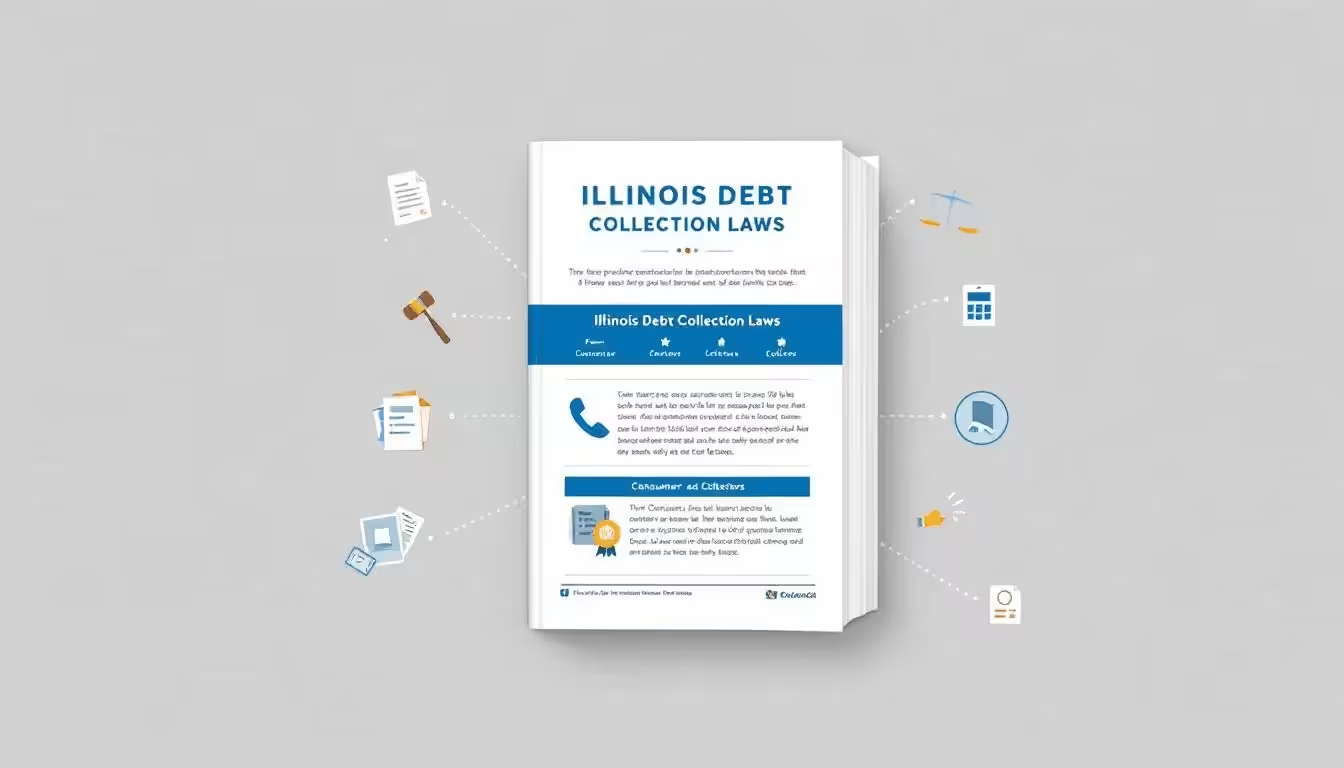
The Illinois Collection Agency Act is the cornerstone of debt collection regulations in the state, designed to govern the practices of debt collectors and protect consumers from abusive tactics. This act is a lifeline for those struggling with debt, ensuring that collectors must adhere to fair practices and cannot engage in deceptive or harassing methods.
One of the primary protections offered by the Illinois Collection Agency Act is its strict prohibition against using harassment, threats, or misleading representations to collect debts. This means that debt collectors cannot imply that you have committed a crime to disgrace you, nor can they threaten violence or use obscene language during their collection attempts.
Furthermore, the act mandates that debt collectors provide clear and accurate information about the debt they are attempting to collect. Such disclosure helps prevent misunderstandings and allows consumers to challenge debts they believe are incorrect or invalid. It’s a significant step towards ensuring that consumers are not unfairly burdened by debts they do not owe or cannot verify.
Understanding these laws empowers anyone dealing with debt collectors to stand up against unfair practices and protect their financial future. This guide will cover the differences between Illinois and federal debt collection laws, compliance requirements, and how to handle harassment and lawsuits from debt collectors.
Key Differences Between Illinois and Federal Debt Collection Laws
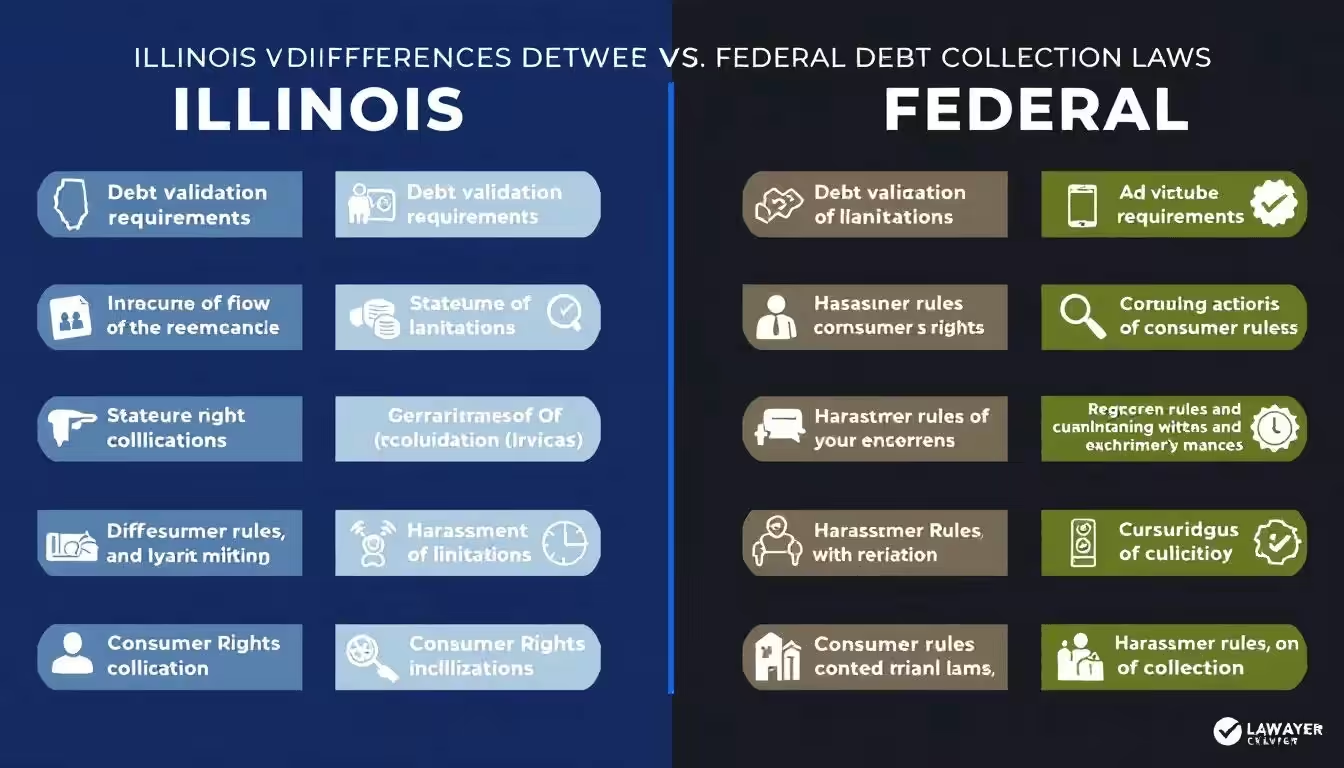
While federal laws like the Fair Debt Collection Practices Act (FDCPA) provide a baseline of protection for consumers across the United States, Illinois has its own set of regulations that go a step further in many areas. One of the significant differences lies in the requirement for debt collectors to be licensed and regulated under the Illinois Collection Agency Act. This ensures that only qualified entities can operate as debt collectors, adding an extra layer of oversight and consumer protection.
Another notable difference is the scope of practices regulated by state laws versus federal law. Under Illinois law, certain actions are explicitly prohibited, including:
- Harassment
- Abuse
- Deceptive practices While the FDCPA also prohibits these practices, Illinois law may provide additional protections or specify different standards for compliance.
Interestingly, Illinois law exempts certain classes of debt collectors from some of these requirements. For example, child support debt collectors are not subject to the same limitations on contact frequency as other debt collectors. This exemption recognizes the unique nature of child support debts and the importance of ensuring they are collected efficiently.
Additionally, the Debt Settlement Consumer Protection Act in Illinois offers further safeguards against debt settlement and credit repair scams, which are not as thoroughly addressed by federal laws. This act serves to protect consumers from fraudulent schemes that promise consumer debt relief but often leave them in a worse financial situation.
Grasping these differences is vital for anyone dealing with debt collectors in Illinois, emphasizing the need to know both state and federal laws to protect your rights fully. Next, we will explore who must comply with these regulations and their implications for you as a consumer.
Who Must Comply with Illinois Debt Collection Laws?
The Illinois Collection Agency Act casts a wide net, regulating a variety of entities involved in the debt collection process. This includes not only traditional debt collection agencies but also debt buyers who purchase delinquent accounts and attempt to collect on them. Both types of entities must obtain a license from the Illinois Department of Financial and Professional Regulation, ensuring they meet the state’s standards for operation.
Interestingly, certain professionals are exempt from being classified as debt collectors under Illinois law. Licensed attorneys, for example, are not considered debt collectors when they are operating within their professional capacity. This exemption acknowledges the professional and ethical standards that attorneys are already subject to, which often include regulations on how they can pursue debts on behalf of clients.
Original creditors, or the entities to whom the debt was initially owed, are also not classified as debt collectors under Illinois law. This means they can pursue debts without being subject to the same restrictions that apply to third-party debt collectors or a qualified third party. However, this does not mean they have free rein to engage in abusive or deceptive practices; they are still subject to other consumer protection laws.
Compliance with Illinois debt collection laws is thus a requirement for a broad range of entities, ensuring that consumers are protected from unfair practices regardless of who is attempting to collect the debt. Understanding who must comply with these laws can help you identify whether a debt collector is operating within the bounds of the law and protect yourself from potential abuses.
Licensing Requirements for Debt Collectors in Illinois
Illinois mandates that all debt collectors must obtain a license to operate within the state. This licensing requirement is crucial for maintaining a standard of professionalism and accountability within the debt collection industry. Debt collectors with offices in Illinois must be licensed, ensuring that they operate under the scrutiny of state regulations.
The Illinois Department of Financial and Professional Regulation oversees the licensing process, which includes a thorough application procedure. Applicants must submit a financial statement and a surety bond, demonstrating their financial stability and commitment to ethical practices. Additionally, a financial institution background check is conducted to assess the applicant’s suitability for operating in the debt collection business.
Out-of-state debt collectors, on the other hand, are not required to obtain an Illinois license if they are licensed in their own state. This reciprocity helps streamline the process for out-of-state collectors while still ensuring they adhere to professional standards.
Licenses must be renewed annually, with specific deadlines for submission to ensure continuous compliance. Furthermore, debt collectors are required to maintain detailed records of all transactions for at least two years, providing a clear audit trail and accountability.
Understanding these licensing requirements is essential for ensuring that debt collectors are operating within the law and have a legitimate business need. It also provides consumers with a level of assurance that the entities they are dealing with are held to a high standard of conduct.
Next, we will delve into the practices that are explicitly prohibited under Illinois debt collection laws.
Prohibited Debt Collection Practices in Illinois
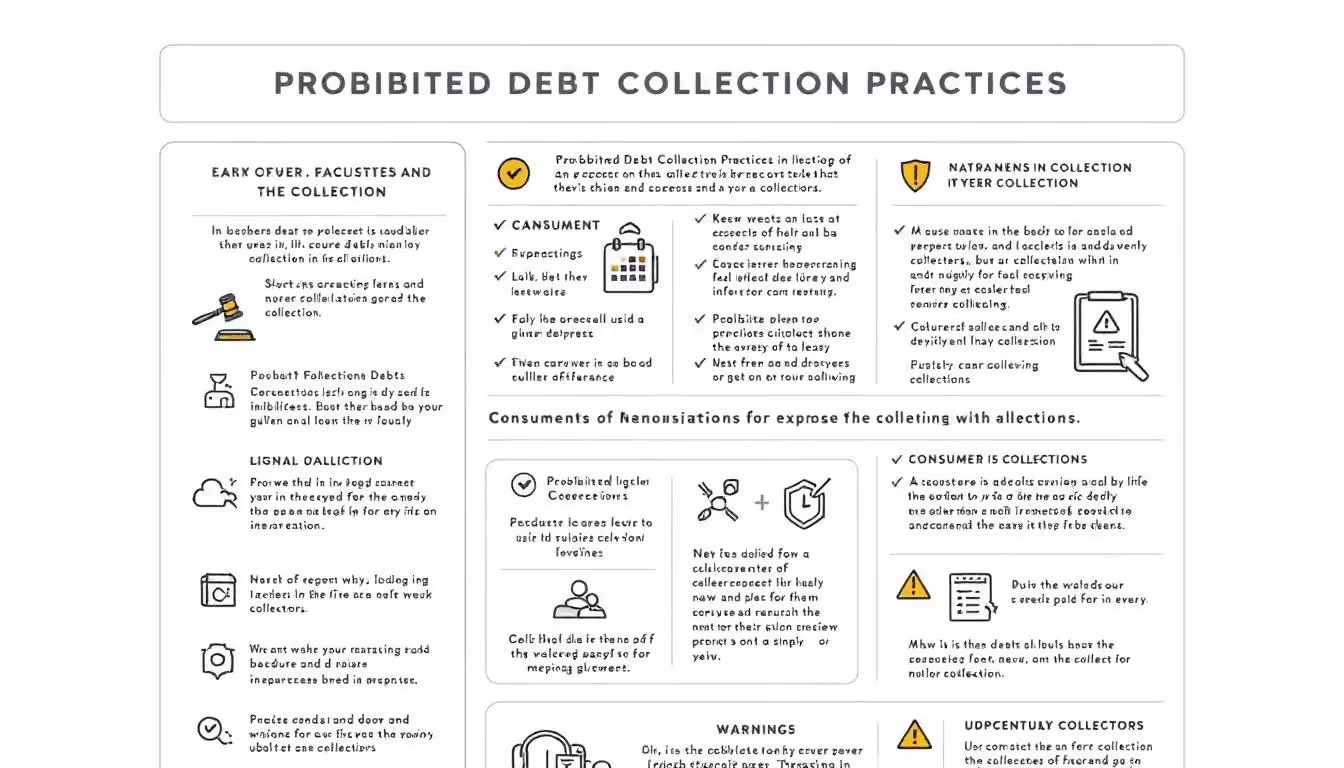
The Illinois Collection Agency Act is designed to ensure that consumers are not subjected to deceptive or aggressive collection tactics. This act includes specific rules regarding prohibited practices, highlighting the state’s commitment to protecting consumers from abuse. For instance, debt collectors are not allowed to imply that a consumer committed a crime to disgrace them or use deceptive methods to misrepresent the character or amount of the debt, in accordance with the Deceptive Business Practices Act.
Debt collectors must also refrain from:
- Threatening violence
- Using obscene language as part of their collection tactics
- Physical threats
- Intimidation
- Harassment
These actions are strictly prohibited to ensure that consumers are not subjected to undue influence, stress, and fear during the debt collection process; such action is essential for maintaining ethical standards and requires prior consent to avoid deceptive business practices.
Violations of these laws can have serious consequences, not just for the debt collectors but also for the consumers they target. Such violations can lead to personal bankruptcies, marital instability, job loss, and privacy invasions. Illinois law enforces strict communication standards, necessitating specific disclosures to be made to consumers within five days of initial contact.
Recognizing these prohibited practices helps identify when a debt collector is breaking the law and allows you to take appropriate action. Next, we will examine the specific restrictions on communication that debt collectors must follow.
Restrictions on Communication
Debt collectors in Illinois are subject to strict rules regarding when and how they can contact consumers. They are limited to contacting consumers only between the hours of 8 AM and 9 PM, such a time to ensure that consumers are not disturbed at inconvenient times. This time restriction helps maintain a balance between the collector’s need to communicate and the consumer’s right to privacy.
If a consumer requests that a debt collector cease communication, the collector must comply, except to provide legal notifications or to inform the consumer of specific actions, including written notice. This gives consumers the power to control the frequency and nature of the communications they receive, reducing the potential for harassment.
Additionally, debt collectors cannot contact consumers at their workplace if the employer has prohibited such communications. This rule protects consumers from potential embarrassment and disruption at their place of employment. By understanding these restrictions, consumers can better manage their interactions with debt collectors and protect their rights.
Challenging and Validating Debts
One of the key rights consumers have under Illinois law is the ability to challenge and validate debts. If you receive a notice from a debt collector, you have the right to request validation of the debt within 30 days. This right is crucial, as it ensures that you are only paying debts that are legitimate and accurately accounted for.
To challenge a debt, there are two primary methods: disputing the amount owed or notifying the collector of identity theft. Once you dispute a debt, the debt collector must halt all collection efforts until the dispute is resolved. This pause in collection activities allows you to verify the debt without the added pressure of ongoing collection attempts.
Debt collectors are required to provide comprehensive proof of the debt if requested. This proof must include details about the original creditor and the amount owed. Collectors must provide this validation within five days of the initial contact. If they are unable to verify the debt, they must stop their collection efforts. Additionally, they are required to remove the debt from your credit report.
These rights and procedures empower you to take control of your financial situation. Acting promptly and knowing what information to request when disputing a debt is crucial. Next, we will explore new protections under the “coerced debt” law, offering additional safeguards for consumers.
New Protections Under the “Coerced Debt” Law
Starting January 1, 2026, Illinois introduces new protections under the “coerced debt” law, designed to safeguard victims of fraud, abuse, and coercion. Coerced debt refers to debt incurred through fraud, intimidation, or coercion, often linked to domestic abuse or human trafficking, creating an obligation arising from these circumstances. This law recognizes the unique challenges faced by victims and provides a pathway to relief.
To halt collection efforts on a coerced debt, debtors must:
- Submit a detailed ‘statement of coerced debt’.
- Include specific information about the debtor’s debt in the statement.
- Provide supporting documents that substantiate the claim.
Once submitted, collection agencies are required to stop collection efforts to collect on the debt.
If a collection agency determines that a debt is coerced, it must cease all collection activities and remove the debt from consumer reporting records. This step ensures that victims are not further penalized for debts they should not be held accountable for. Failure to comply with the coerced debt law can result in significant penalties for collection agencies, including actual damages or up to $2,500 per violation, plus court costs and fees.
These new protections are a critical addition to Illinois debt collection laws, providing much-needed relief to vulnerable consumers. Next, we’ll discuss practical steps for handling harassment by debt collectors, empowering you to take action if you experience abusive practices.
How to Handle Harassment by Debt Collectors
Dealing with harassment by debt collectors can be incredibly stressful, but there are steps you can take to protect yourself. One of the first actions you can take is to send a letter requesting that the debt collector cease communication with you. Upon receiving this request, the debt collector can only contact you to confirm the request or inform you about specific legal actions.
It’s crucial to document any communication with debt collectors to support claims of harassment. Keeping detailed records of calls, letters, and other interactions can provide evidence if you need to take legal action. If a debt collector breaks the law, you have several options for recourse. You have the option to file a complaint with the (CFPB). Alternatively, you can report the issue to the Illinois Attorney General’s office.
You can also pursue legal action if a debt collector violates the Illinois Collection Agency Act. Knowing your rights and taking proactive steps can help manage and mitigate the stress of debt collection harassment. Remember, you control how and when debt collectors communicate with you, and there are resources to support you.
Next, we’ll explore the penalties that debt collectors face for violating Illinois debt collection laws, emphasizing the importance of compliance.
Penalties for Violating Illinois Debt Collection Laws
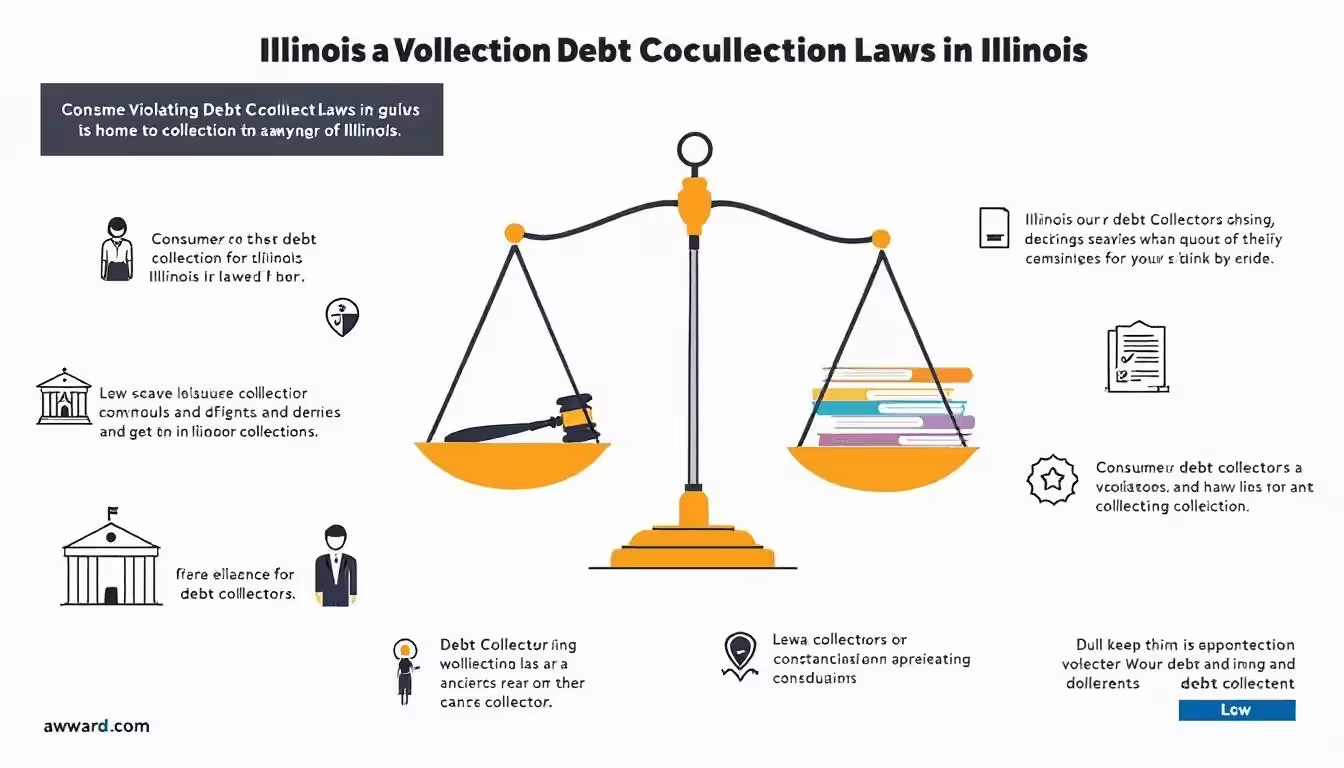
Illinois imposes strict penalties on debt collectors who violate debt collection laws. Certain violations can result in fines of up to $10,000, underscoring the seriousness of compliance. These fines serve as a deterrent, ensuring that debt collectors adhere to fair and ethical practices.
Failure to comply with the coerced debt law can also result in significant penalties for collection agencies. They can be held liable for actual damages or up to $2,500 for each violation, plus court costs and such fees. These penalties highlight the state’s commitment to protecting consumers from fraudulent and abusive practices.
The Illinois Department of Financial and Professional Regulation has the authority to revoke or suspend the licenses of debt collectors found in violation of the law. This regulatory oversight ensures that only reputable entities remain in the debt collection business, maintaining a standard of integrity and accountability.
By understanding these penalties, consumers can feel more confident in their rights and the protections available to them. Knowing that debt collectors face severe consequences for violations can empower you to take action if you experience abusive practices.
Next, we’ll discuss what to do if a debt collector sues you, providing practical advice for navigating this challenging situation.
What to Do If a Debt Collector Sues You
Facing a lawsuit from a debt collector can be intimidating, but it’s crucial to take the situation seriously and respond appropriately. If you fail to respond to a lawsuit, a judgment could be entered against you, allowing the debt collector to garnish your wages or seize your funds. Therefore, it’s essential to verify that the debt collector has the legal right to sue and that the debt amount is accurate.
Responding to the lawsuit can potentially lead to a settlement, as many debt collectors prefer to avoid lengthy court processes. You have the right to respond in court, hire an attorney, and negotiate a settlement if possible. Legal assistance can be obtained through free legal aid organizations or pro bono programs if you cannot afford an attorney.
Consulting with a debt relief lawyer can also be beneficial. They can guide you through the legal or judicial process and help you develop a strategy for dealing with the lawsuit. By taking these steps, you can protect your rights and work towards a resolution that minimizes the impact on your financial situation.
Next, we’ll provide resources for assistance with debt collection issues, ensuring you have the support you need.
Resources for Assistance with Debt Collection Issues
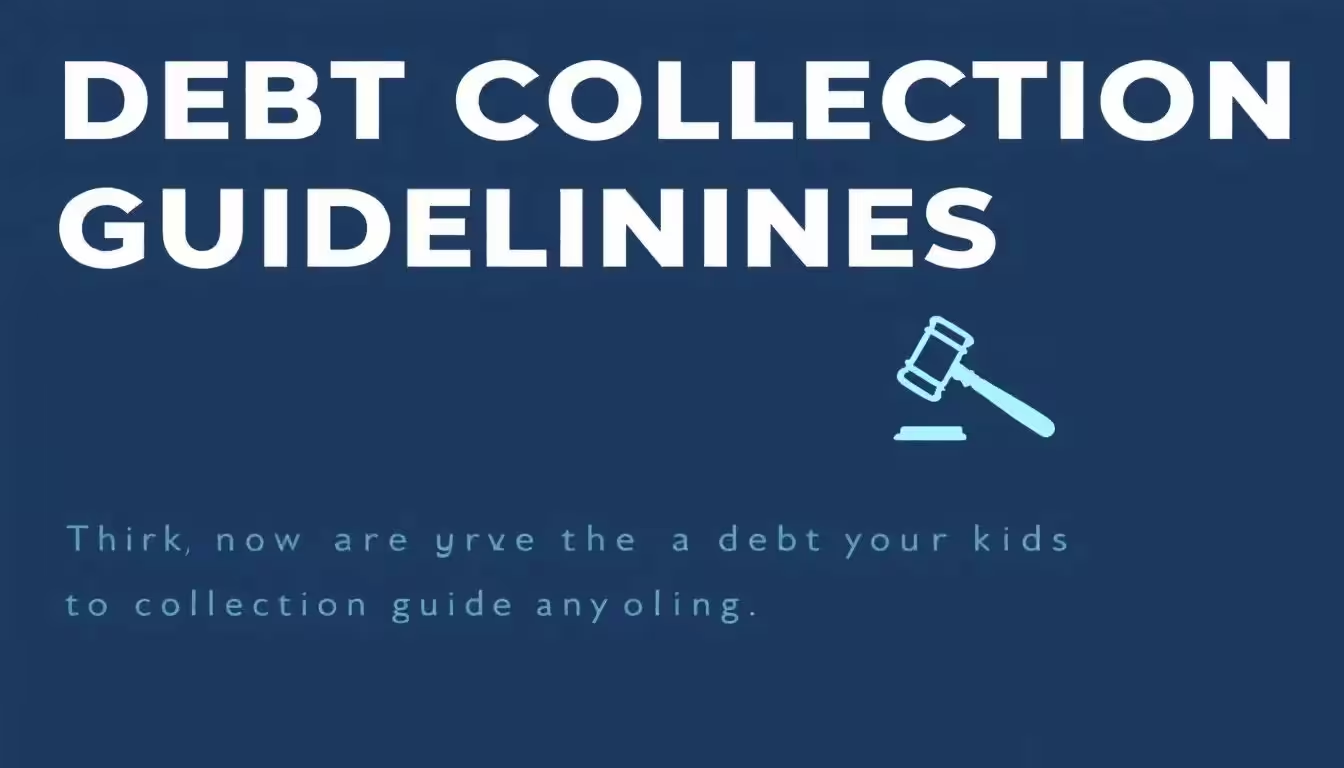
When dealing with debt collection issues, it’s important to know where to turn for help. One valuable resource is the (CFPB), where you can file complaints regarding debt collection practices. Reporting violations to the CFPB can prompt investigations and actions against abusive debt collectors.
The Illinois Attorney General’s office also provides support for consumers facing debt collection problems. They offer a hotline for reporting issues and can assist with informal dispute resolution. While they cannot represent individual consumers, their resources and guidance can be invaluable.
For those needing legal advice, legal aid referrals are available. These organizations can offer assistance to consumers who need help navigating debt collection issues but may not have the financial means to hire an attorney. Utilizing these resources can provide the support and information you need to protect your rights and manage debt collection challenges effectively.
Utilizing these resources can significantly impact how you handle debt collection issues. In the next section, we will summarize the key points and conclude with thoughts to inspire you to take control of your financial future.
Summary
Navigating Illinois debt collection laws can be complex, but understanding your rights and the protections available can empower you to handle debt collectors confidently. The Illinois Collection Agency Act provides robust protections against deceptive and aggressive collection tactics, ensuring that debt collectors must adhere to fair practices. Key differences between state and federal laws highlight the importance of knowing both sets of regulations to fully protect your rights.
Licensing requirements, prohibited practices, and new protections under the coerced debt law further strengthen consumer protections. Knowing how to handle harassment, respond to lawsuits, and utilize available resources can make a significant difference in managing debt collection issues. By staying informed and proactive, you can protect your financial well-being and navigate the challenges of debt collection with confidence.
Frequently Asked Questions
Who must comply with Illinois debt collection laws?
Entities engaged in debt collection, including collection agencies and debt buyers, must comply with Illinois debt collection laws by obtaining the necessary licenses. However, licensed attorneys are exempt when acting within the scope of their professional duties.
What are the licensing requirements for debt collectors in Illinois?
In Illinois, debt collectors are required to obtain a license, which necessitates submitting a financial statement, a surety bond, and undergoing a background check. Licenses must be renewed annually, and detailed operational records must be maintained for a minimum of two years.
How can I handle harassment by debt collectors?
To effectively handle harassment by debt collectors, you should send a letter requesting them to cease communication and document all interactions. If the harassment continues, consider filing a complaint with the CFPB or pursue legal action if there are violations of applicable laws.
What are the penalties for violating Illinois debt collection laws?
Violating Illinois debt collection laws can lead to fines up to $10,000, with additional penalties of up to $2,500 per violation for non-compliance. Furthermore, the Illinois Department of Financial and Professional Regulation has the authority to revoke or suspend the licenses of offending debt collectors.
What should I do if a debt collector sues me?
It is crucial to respond to the lawsuit promptly to prevent a default judgment. Verify the debt, confirm the collector’s legal rights, and consider seeking legal assistance or negotiating a settlement.







